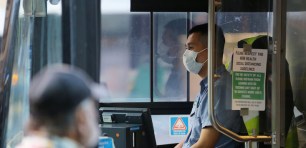
Source: Unsplash/Louis Reed.
Employers who mandated vaccines in the workplace are being urgently warned to consider updating their policies to also include booster shots, as New South Wales and Victoria grapple with increasing cases of the Omicron strain of COVID-19.
Fay Calderone, partner and workplace relations lawyer at Hall & Wilcox, says if the level of protection vaccines give against severe illness wanes after four months, and more rapidly for AstraZeneca, employers that have enforced mandates will need to revise their policies.
“All the work that we’ve done on mandatory vaccinations is not going to be sufficient if it’s not updated,” Calderone tells SmartCompany.
NSW recorded 3057 new local COVID-19 cases in the 24 hours to 8pm on Monday, and 2501 new cases on Sunday. Meanwhile in Victoria, the state recorded 1245 new COVID-19 cases on Monday, after reporting 1302 cases on Sunday.
In response to these increasing COVID-19 numbers, National Cabinet will hold an emergency meeting on Wednesday where Prime Minister Scott Morrison and state premiers will discuss public health measures.
Calderone expects state and federal leaders to examine whether the public health orders that mandate vaccines in high risk industries, such as health care, aged care, disability support services and childcare, are still fit for purpose.
“I think they will start to have a discussion around a national mandate for boosters for high risk settings, but I don’t know when they will make an announcement,” she says.
According to The Sydney Morning Herald, the Australian Health Protection Principal Committee (AHPPC) has advised National Cabinet to adopt moderate restrictions and increase access to booster shots to curb an expected rapid increase of cases over summer.
Victorian Health Minister Martin Foley and NSW Health Minister Brad Hazzard want to see the Australian Technical Advisory Group on Immunisation (ATAGI) fast track access to booster shots for residents in their states.
Minister Hazzard is calling for ATAGI to bring forward access to booster shots so they are available four months after the second vaccine dose. Hazzard’s calls follow a change ATAGI made to its guidelines last week, which now allow people to receive a booster shot five months after their second vaccine dose, instead of six months.
The chief health ministers have also said ATAGI will consider whether the definition of ‘fully vaccinated’ should be revised to include three doses rather than two doses.
If Australia follows the lead of Israel and the United States in updating its regulatory definition of fully vaccinated to include the booster shot, businesses will likely face new requirements when checking the vaccination status of their staff and customers.
Calderone says employers concerned about their work health and safety obligations have the primary obligation to follow the recommendations of the Therapeutic Goods Administration when giving guidance about vaccines.
“Employers obviously have to work within those regulatory parameters,” she says.
Handpicked for you

Fair Work’s ruling in the BHP dispute is not a win for opponents of vaccine mandates



COMMENTS
SmartCompany is committed to hosting lively discussions. Help us keep the conversation useful, interesting and welcoming. We aim to publish comments quickly in the interest of promoting robust conversation, but we’re a small team and we deploy filters to protect against legal risk. Occasionally your comment may be held up while it is being reviewed, but we’re working as fast as we can to keep the conversation rolling.
The SmartCompany comment section is members-only content. Please subscribe to leave a comment.
The SmartCompany comment section is members-only content. Please login to leave a comment.